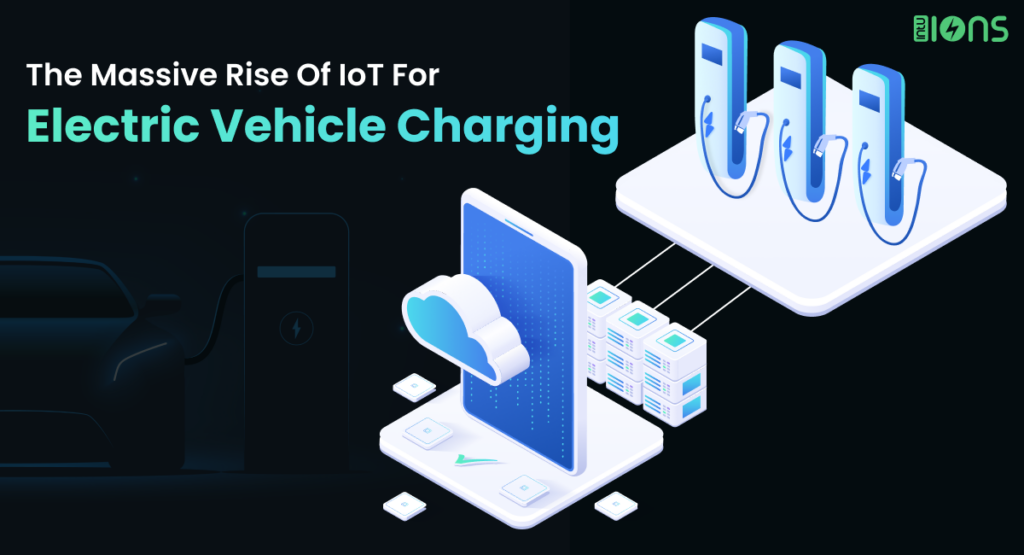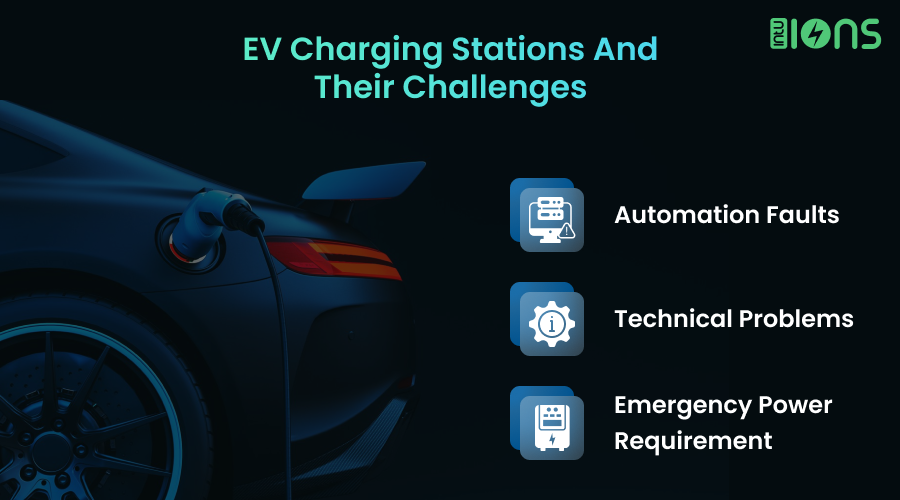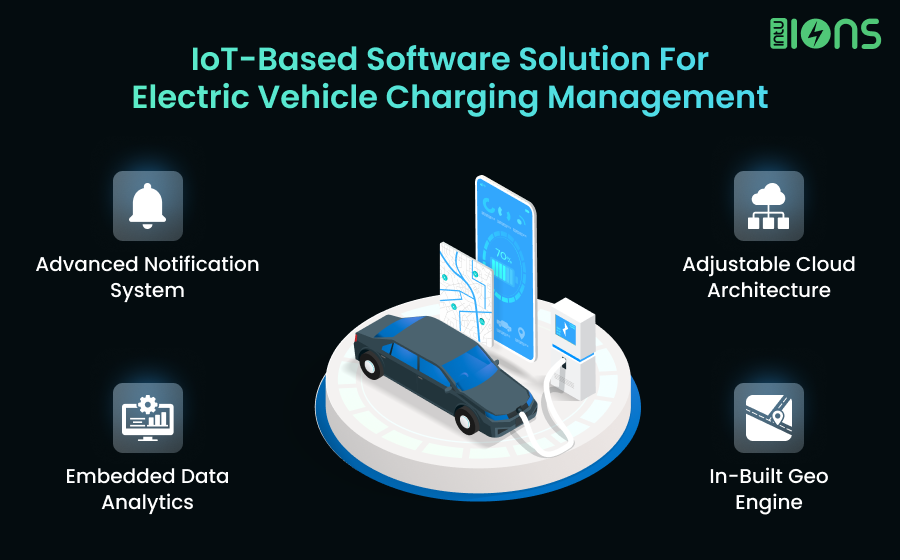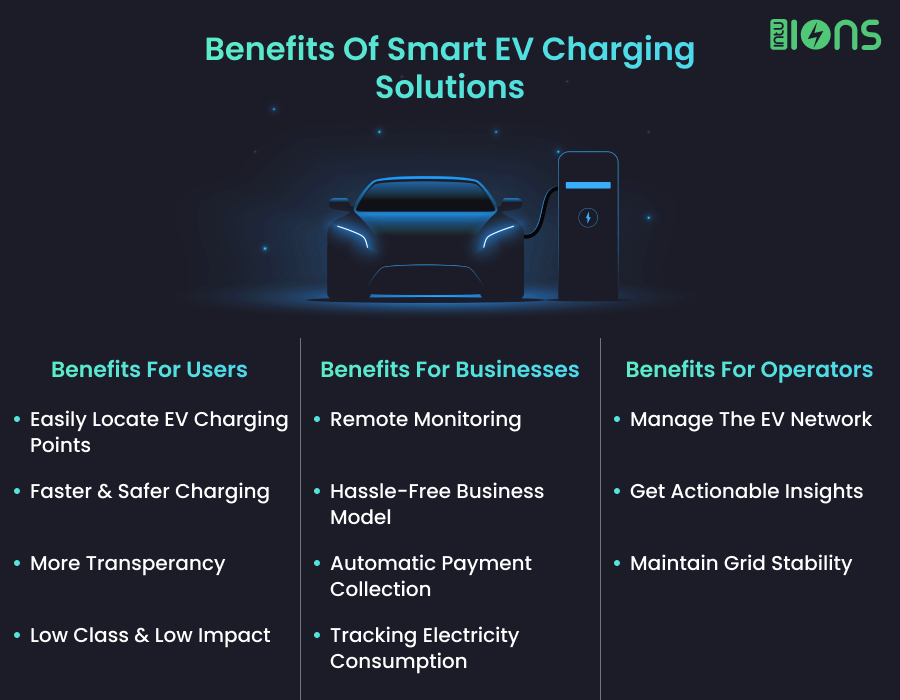The Massive Rise Of IoT For Electric Vehicle Charging

Electric Vehicles are a breath of fresh air compared to most vehicles on the road, which are still gas guzzlers. But charging them is a challenge. IoT proves to have given rise to smart EV charging stations. So what are their main benefits and functions? Let us find out:
There is no doubt that the potential economic value of the Internet of Things (IoT) is large and growing. McKinsey reports that 41% of the IoT’s economic value will be contributed by operations optimization, accounting for $1.3 trillion by 2030.
Now that the demand (and sale) of IoT for electric vehicle charging on the rise, and it is not just about installing charging points. The more significant challenge lies in managing a massive device fleet dispersed across locations. In this article, we will look at how IoT is the perfect solution for Electric Vehicle charging:
The growth and need for EVs
The rising concerns around global climate change have brought Electric Vehicles into the spotlight in a big way. The primitive goal is to mitigate toxic emissions, reduce local pollution, and boost energy efficiency. EVs currently seem to be a sustainable and affordable approach to climate control.
The global EV market is estimated to grow at a CAGR of 23.1%, reaching $1103.17 billion by 2030 from $170 billion in 2021. The demand in the EV market is a critical effect of innovations in the adaptive usability of hybrid powers in recent years.
It also unearths the challenge of local charging points. The current numbers cannot fulfill the demand for quick charging as the Electric Vehicle to charging point ratio has also increased constantly.
Now, what can be a better solution than automated charging points integrated with the smart IoT approach? IoT devices cover speed, real-time data retrieval, and punctual energy availability for every Electric Vehicle. That is precisely what is needed!
IoT is an advancement that cannot be ignored in this day and age. It has made its presence felt in almost every sector – healthcare, automotive, oil and gas, and education.
IoT is described as the network of physical objects or “things” embedded with software, sensors, and other technologies for connecting and exchanging data with other systems and devices over the network.
The technology essentially contributes to the broader adoption of Electric Vehicles. IoT-enabled EV charging infrastructure will help deliver future expectations with cutting-edge technology. Innovative vehicle charging systems are optimized to prevent any compromise in the security and performance of EVs.
A smart vehicle charging system: Future of e-mobility
Unlike fossil fuel-driven two and four-wheeler vehicles, Electric Vehicles run on renewable energy and do not have high maintenance costs. However, the lack of charging stations is the biggest problem hampering the optimal use and performance of EVs.
IoT plays a crucial role in making the charging process seamless. It keeps the vehicle digitally connected to the charging station. The functionality can be described as a virtual interface to serve the EV owner and the service provider.
This virtual platform comprises three standard tools: the charging station, mobile application, and management software. A web application is prompted to connect the charging station with the user. The application helps navigate the charging station location, slot booking, charging schedule management, and payments.
It is essential to control such aspects through mobile to secure a fast and suitable operation and maintain the vehicle easily. All complex operations cannot be run without a simulated system integrated with back-end data.
A cloud-based EV management platform supports an extensive real-time database. It is connected with IoT sensors and endpoints. A cloud-based server (like Azure IoT hub) can connect virtual devices (such as the web application on your phone) and handle simultaneous operations of the SQL database, machine learning algorithm, and blob storage.
All the information received from the charging stations, Electric Vehicles, and power suppliers is analyzed through a trained ML model. The colossal operation is not only set to find the time slot for EV charging but to maintain up-to-date data about all Electric Vehicles for the following reasons:
- The ability to detect battery failures beforehand
- Battery charging capacity, charging state, and battery status monitoring for the Electric Vehicle
- User authentication through mobile apps followed by suitable time slot booking to avoid any queue.
- Unit pricing updates for particular power supply providers, their peak load balance, and energy consumption
When all the above-mentioned processes are combined for multiple vehicles at a time, it is complex to fetch accurate data and control the user demand in real time. That is why we need IoT to automate critical processes as trained. Also, each module can be manipulated or optimized depending on the current requirements.
EV charging stations and their challenges
EV charging is not simple as we cannot go to a charging station and recharge the vehicle as needed. It is nothing like going to a gas or fuel station. The key challenges include:

1. Automation faults
As the major operations in the EV charging system depend on automation and machine learning, any bug or glitch can cause a huge loss of resources. If the data does not reach the cloud database in time, the whole process can get delayed.
These challenges are currently present as the idea of using Electric Vehicles on a large scale is still in the testing phase. IoT-based software solutions help resolve infantile problems and make the complete process flexible and user-friendly.
2. Technical problems
If the charging stations go offline for some time, getting the booking slot requests or details of charging availability becomes complicated. It is challenging to keep all the charging stations online 24/7 as there can be technical maintenance requirements or sudden glitches at any time.
3. Emergency power requirement
If an Electric Vehicle needs emergency charging, it will be complicated to avail of any charging stations as they could already be occupied in advance. Unlike contemporary gas stations, EV charging station solutions are not so flexible until now.
IoT-based software solution for Electric Vehicle charging management
A cloud-based IoT software integrates EV charging station control, usage, and management systems into a single wireless network. It starts working by collecting extensive data points from distinct devices and analyzing them to get a user-friendly solution. Four major components help this software to be suitable for EV charging management, which are:
1. Advanced notification system
The notification feature helps simultaneously notify the power demand, consumption, and technical faults to justify the previous advantages.
Managing and monitoring the whole service station for an EV can be complicated without modern technical assistance. IoT helps in building that single network where users get convenient service.
2. Adjustable cloud architecture
The flexible cloud storage system enables public, private, or hybrid storage deployment based on the requirement. So, one can securely process all the large data received from user applications and the confidential data to get a balanced charging slot for each user.

3. Embedded data analytics
Real-time data related to electric current, voltage, power consumption, and temperature is processed smartly to get effective solutions for the customers. It enables balanced assistance for the workers at a charging station. Billing and payment are also easy and secure. IoT software can predict behavior patterns depending on the user’s roles and functions. It helps offer an advanced support system to the customer in need without wasting time.
4. In-built geo engine
A geo-dashboard enables the live location tracking system to inform the driver about the nearest charging point. Also, this software can display whether a station is occupied or free at that particular time.
IoT for EV charging stations
EVs have substantial potential to replace fossil fuels in the transport sector. It explicitly defines the demand for consumer and commercial Electric Vehicles and global EV charging stations in the upcoming years. Few indicators of the rising demand include:
- With the EV charging station market size valued at $11 billion in 2021, the stations are expected to grow at a CAGR of 25% between 2022-30. Plus, public charging stations can rise by 26%.
- The stations are projected to grow to 14,623 thousand units by 2027 from 2,354 thousand units in 2022 – at a CAGR of 44.1%.
- The global EV charging infrastructure market potential is estimated to reach $43.07 billion by 2026 – rapidly rising at a CAGR of 32.65% from 2022 to 2026.
The exponential growth of smart EV chargers comes with the development of strong and sturdy IoT-powered smart EV charging station infrastructure.
Benefits of smart EV charging solutions
The smart EV charging solution authenticates EVs via the charging station’s mobile app (the EV owner’s charging app). Thereafter, it seamlessly connects the EV with charging equipment, called the Charge Point Operator (CPO), over a secured data network. Let us understand how a smart charging solution is advantageous:

1. Benefits for users
Smart EV charging offers users (EV owners or drivers) end-to-end support in the following ways:
a. Easily locate EV charging points
The dedicated mobile app helps users quickly locate the nearest charging stations. Additionally, the app furnishes detailed information on the available time slots, charging power capacity, and pricing. The users can smoothly schedule and reserve a spot at their earliest convenience.
b. Faster and safer charging
Unlike household sockets, smart EV charging solutions are different and designed for performing with high power capabilities. The maximum charging capacity of the ideal charging equipment is 22 kW. However, the fast charging stations have the utmost capacity of 150 kW.
They thoroughly test the connection between the EV and charging equipment by utilizing automated monitoring. The charging initiates only after passing all the checkpoints, which is completely safe.
c. More transparency
The smart EV charging solution deploys concrete user authentication to verify the EV owner’s profile. After successful authorization via RFID card/tag or mobile app, the users can access the charging services.
The smart back-end solution uses automated billing that provides one-time payment transaction services. The users are billed on real-time charging station pricing and the energy consumed.
d. Low cost and low impact
The mobile app notifies users about low-cost charging rates during off-peak hours. The users can simply optimize the timing of their EV’s charging event at low consumption. This practice will balance the power grid (mitigate environmental impact) and help users save money.
2. Benefits for businesses
A smart EV charging solution facilitates real-time insights for businesses of all kinds, helpful for monitoring and optimizing energy consumption:
a. Remote monitoring
A cloud-based management platform can concurrently perform various business operations, such as fetching real-time reports and statistics of power usage, controlling charging events remotely, updating charging stations’ information and pricing details, and so on.
Moreover, businesses can group multiple charging stations and operate them as a stack. Every operation is thus automated and supervised equally.
b. Hassle-free business model
The intelligent back-end solution saves money and time by enabling businesses to concentrate on commerce and capitalization. These solutions are future-proof and scalable.
c. Automatic payment collection
Automated billing at smart EV charging stations streamlines payment transfers to businesses. They are either instant or periodic, based on the accounting support by the platform.
d. Tracking electricity consumption
The management platform monitors the EV power consumption in real-time to optimize charging events. In addition, the grouping of charging stations helps businesses track the local grid’s capacity to avoid power drops.
3. Benefits for operators
Smart EV charging solutions significantly help grid operators to manage the concurrent energy consumption and surge in energy demand:
a. Manage the EV network
The mobility industry trend and innovations are progressing every single day. Therefore, predicting and accommodating all future needs is impossible before the final deployment. However, smart EV charging solutions are extensible enough to be updated following the latest advancements.
b. Get actionable insights
All concurrent activities and data are synched in the central smart management system. As a result, the grid operators can anytime and anywhere deduce actionable statistical reports of the charging stations. Overall, it keeps the stakeholders up to date with real-time vital metrics.
c. Maintain grid stability
Promoting EV charging services at low electricity consumption benefits grid operators and businesses. It is the best way to improve energy utilization, reduce power downtime, and drive new business opportunities.
The innovative solution facilitates energy management features and instant notification alerts to market low-cost charging packages, incentives, and lucrative offers. This, in turn, stabilizes the grid’s performance corresponding to power usage at the charging stations.
d. Keep pace with customer needs
The smart management platform lets grid operators and businesses dive deeper into overall profitability. It helps with information about the charging station, its pricing model and incentive packages. They can understand consumer preferences and the average paying capacity with such metrics. Hence, businesses can test different offers to scale sales and accordingly handle consumption at station groups.
Functions of IoT solutions for smart EV charging management
IoT-powered smart EV charging solution aims to serve a pool of capabilities and functionalities requiring minimum efforts, including:
1. Regular health checkups and fault detection
The IoT-powered innovative solution streamlines the users’ charging experience and prevents downtime through periodic troubleshooting and fault monitoring.
2. Managing capacity and behavior analysis
The grouping of charging stations fosters grid stabilization and maintenance. Additionally, it encourages incentives for availing services at low consumption.
3. Real-time alerts and notification
The users get instant information about any important updates about the charging stations within the app itself – for instance, offers, critical failures, maintenance breaks, and so on.
4. Robust and secure payments
The end-to-end user authentication and real-time power usage automated billing ensure secure plus transparent payment transactions.
5. Protocol and connectivity
The smart charging equipment is integrated with solid charging protocols, sensors, power electronics, and connectivity devices for smooth operations.
6. EVSE Control
The IoT sensors and other connected devices gather key instruments to analyze and control the smart EV charging station Infrastructure, such as charging events, grid limit, EV battery capacity, energy tariffs, and so on.
IoT for electric vehicle charging: Technology that adapts to business requirements
To maximize the usability, viability, and adoption of IoT technology in electric vehicle charging, the charging stations must be first available to vehicles at all times.
With thousands of charging points located in different locations worldwide, there is a need for secure data connections that contribute to transparent payments and predictive maintenance of the charging stations.
Considering feasibility, various short and long-range distance wireless technologies were tested. GSM mobile communication fared better than the others due to its already-vast mobile network availability and cost-effectiveness, given the minute amounts of data transmitted.
Over to you
No one can stop Electric Vehicles from going mainstream thanks to reduced battery prices, increased driving range, and more options from leading automobile makers. However, for Electric Vehicles to sustain, there is a need for a reliable charging infrastructure, which is possible because of IoT.
It is a fundamental block for building next-gen devices and solutions such as smart charging and vehicle-to-grid. IoT helps minimize downtime, ensure efficient energy management, and create a massive roaming network for a seamless charging experience.
If you are interested in building an IoT-powered app for Electric Vehicle charging, you have come to the right place. We have previously done projects in similar spaces and would love to help you. Without further ado, get started here.
